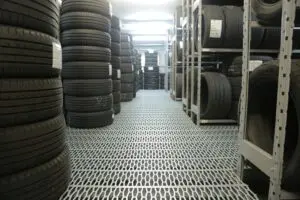What Are the Tire Requirements for Commercial Trucks?
Truck tires play a vital role in a commercial vehicle’s safety, directly impacting braking, steering, and driving performance. However, over time, tires can wear down and become hazardous, putting everyone on the road at risk. Commercial truck drivers and owners must comply with strict tire regulations to ensure safety. If you’ve been involved in a truck accident where tire failure was a factor, it’s essential to understand how tire maintenance and safety standards may have been violated. 
Federal Commercial Truck Tire Safety Standards
Federal Commercial Truck Tire Safety Standards are in place to prevent accidents caused by tire failures. These regulations include minimum tread depth requirements to ensure proper traction, tire pressure monitoring rules to avoid under-inflation, and specific regulations for steer axle tires to provide stability.
Additionally, retread tires must meet strict safety guidelines to reduce the risk of blowouts. When these safety standards are violated, truck accidents can occur and lead to serious injuries. If you suspect that safety regulations were ignored in your accident, let our experienced attorneys investigate and help you pursue your case with favorable results.
Essential Requirements and Compliance Guidelines
Federal regulations mandate that commercial truck tires must maintain a minimum tread depth of 4/32 inches on steering axles and 2/32 inches on all other axles. Steer tires cannot be regrooved, recapped, or retreaded, and must have a load rating that matches or exceeds the vehicle’s front gross axle weight rating (GAWR). All commercial truck tires must be matched in size and type on the same axle, and speed ratings must be appropriate for the truck’s intended use, typically 75 mph for most commercial operations.
Tire pressure must be maintained within 10% of the manufacturer’s recommended cold inflation pressure, which varies by tire size and load but typically ranges from 85-130 PSI. Additionally, DOT regulations require visible DOT codes on all tires, indicating the manufacturer, size specifications, and date of manufacture, with tires over 6 years old requiring special inspection protocols.
Commercial Truck Tire Failures and Your Legal Rights
Commercial truck tire failures are a leading cause of accidents on the road, with common issues including blowouts, tread separation, under-inflation, and improper maintenance. These tire-related failures can result in catastrophic crashes, especially when they happen at high speeds or in unfavorable driving conditions. A study by the National Motor Vehicle Crash Causation Survey found that 9% of the crashes examined involved vehicles with tire problems prior to the crash, equating to 2,188,970 accidents nationwide.
If you’ve been injured in a truck accident due to a tire failure, you have legal rights to seek compensation for medical expenses, lost wages, and pain and suffering. At Munley Law, we specialize in helping victims of tire-related truck accidents. Contact our experienced lawyers for a free consultation if you’ve been injured in a truck accident involving tire failure.
The Devastating Impact of Truck Tire Blowouts
Truck tire blowouts can lead to catastrophic accidents, causing severe injuries such as traumatic brain injuries, spinal cord damage, broken bones, and internal injuries. These blowouts often result in multi-vehicle crashes when a truck loses control and collides with other cars or roadside barriers.
Emergency response procedures are crucial in these situations, as prompt medical care and investigation can help victims recover and determine fault. If you’ve been injured in a truck tire blowout accident, it’s important to understand your rights and pursue the compensation you deserve. Contact us for a free consultation today.
Understanding Tire Defects vs. Maintenance Negligence
Tire defects and maintenance negligence are two common causes of truck accidents. Manufacturing defects, such as faulty tire construction or design, can lead to blowouts or tread separation, while poor maintenance — including failure to monitor tire pressure or replace worn tires — can also contribute to accidents.
In some cases, recalls may identify known tire issues that should have been addressed. Determining liability can be complex, as it may involve both the tire manufacturer and the trucking company. Our truck accident lawyers can help identify all responsible parties and ensure you receive the proper compensation for your injuries.
Common Tire-Related Violations in Commercial Trucking
In commercial trucking, violations such as inadequate tire inspections, using mixed tire types or sizes, and performing improper tire repairs can all compromise vehicle safety. Worn-out treads that exceed legal limits, often overlooked, significantly increase the risk of blowouts.
These violations can lead to devastating accidents, putting everyone on the road in danger. If you’ve been injured in a truck accident, our team can investigate whether tire violations contributed to the incident — and help you pursue your case with confidence.
Trucking Company Liability for Tire Maintenance
Trucking companies are legally required to maintain detailed records of tire inspections, maintenance, and repairs. Companies must make certain that their trucks meet safety standards, including regular tire checks and proper tire replacement. While drivers are responsible for conducting pre-trip inspections, the ultimate responsibility for maintaining the vehicle’s safety often lies with the company.
When these companies neglect proper tire maintenance, it can result in hazardous accidents and serious injuries. If you’ve been involved in a truck accident caused by tire issues, let our experienced attorneys investigate whether negligent maintenance contributed to the incident.
Financial Impact of Tire-Related Truck Accidents
According to the Federal Motor Carrier Safety Administration, “tires” were the most commonly cited vehicle-related factor in fatal crashes involving passenger vehicles, accounting for about 1% of all cases in 2021. These accidents are devastating, not only due to life-altering injuries or loss of life but also because of their significant financial losses.
Medical costs for injuries can be substantial, especially if surgery or long-term rehabilitation is required. Accident victims may also experience lost wages or a reduced earning capacity due to their injuries. Property damage, including vehicle repairs and other losses, adds to the financial strain as well.
Long-term rehabilitation or therapy costs can also accumulate, affecting your future financial stability. Our experienced team can help you assess the full extent of your accident-related damages, ensuring you seek the compensation necessary for your recovery and financial well-being.
Critical Steps After a Truck Tire-Related Accident
After a truck tire-related accident, taking the right steps can help protect your legal rights. Here are critical actions to take:
- Gather Evidence: Take photos of the accident scene, tire damage, and any vehicle or property damage.
- Document Injuries: Seek immediate medical care and keep records of your injuries, treatments, and doctor visits.
- Deal with Insurance Companies: Be cautious when communicating with insurance adjusters. Consult an experienced truck accident attorney before accepting any settlements.
Don’t face the aftermath alone — contact our experienced truck accident attorneys for help.
Prevention and Safety Tips for Drivers Near Commercial Trucks
 When driving near commercial trucks, always maintain a safe following distance — ideally at least four seconds behind a truck. This gives you ample time to react to unexpected movements or potential tire problems, such as sudden swerving or abrupt stops. Trucks can also kick up debris, which can damage your vehicle or cause an accident. Keep a sharp eye out for signs of tire issues, including uneven wear, bulges, or visible damage, as these may indicate an impending blowout.
When driving near commercial trucks, always maintain a safe following distance — ideally at least four seconds behind a truck. This gives you ample time to react to unexpected movements or potential tire problems, such as sudden swerving or abrupt stops. Trucks can also kick up debris, which can damage your vehicle or cause an accident. Keep a sharp eye out for signs of tire issues, including uneven wear, bulges, or visible damage, as these may indicate an impending blowout.
If the tire blows, try to stay calm and avoid panicking. Keep your steering steady and steer straight without overcorrecting. Gradually slow down by easing off the gas pedal, but avoid slamming on the brakes, which could cause your vehicle to skid. Be sure to always stay in your lane and make sure you have an escape route if the truck starts to veer into your lane.
By following these tips, you can help reduce the risk of accidents and stay safer on the road — especially when driving near large commercial trucks. Being proactive and aware of potential tire hazards is key to preventing dangerous situations. If you’ve been injured in a truck accident, contact our truck accident attorney in Pittsburgh, Scranton and Allentown for expert legal assistance.









